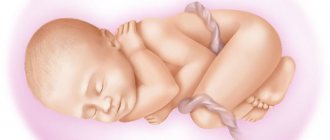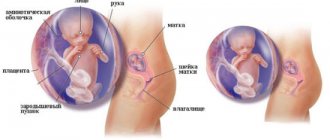- 27th week of pregnancy - how many months?
- Fetus
- Ultrasound
- Uterus
- Stomach
- Pain
- Sex
- Discharge
- Analyzes
- Feel
- Nutrition
- Weight
27th week of pregnancy - how many months?
6.5 months of pregnancy are behind us. This and next week will make it seven, and this is already a kind of milestone. You may have noticed that a little less time has actually passed, which may have gotten you a little confused in your calculations. This is because in obstetrics months are measured differently: 1 month is not equal to 30-31 days, but to four weeks, that is, 28 days.
You are now entering the 27th week of pregnancy. The child has already grown up and improved enough, but his development does not stop for a minute. What awaits us this week?
Symptoms of uterine tone in the 2nd trimester by week of pregnancy
Week 14 During this period, the uterus has already increased sufficiently in size and can be felt above the pubic joint. The still small tummy protrudes forward.
At 14 weeks of pregnancy, any tension can result in a spontaneous miscarriage. Its symptoms are as follows:
- Bleeding from the genital tract;
- Frequent contractions of the uterus, following each other at intervals of several minutes;
- Severe pain in the lower back and lower abdomen.
The doctor determines incomplete dilation of the cervix and weakening of the muscular ring of the uterine pharynx.
Hypertonicity of the uterus during pregnancy can be provoked by any stress at home or at work, negative emotions - fear, anger, strong excitement.
Week 15. The baby is already actively moving in the stomach, but there are no sensations of kicking yet. At week 15, myometrial tension may occur due to constipation or excessive bowel activity.
Week 16 Signs of uterine tone in the second trimester manifest themselves in the form of discomfort and cramps in the abdomen. “It’s like you’re on your period,” the women say.
17-18 weeks. It is characterized by the baby’s rapid growth and rapid weight gain. This causes the uterus to stretch, becoming the size of a melon. At week 18, the woman experiences slight discomfort, which occurs due to the pressure of the uterus on the navel on the inside. If there is no pain, there is no need to worry.
19-20 weeks. The period is characterized by the beginning of fetal movement. Women carrying their first child may mistake the baby's kicks for manifestations of uterine tone. Movement at the 20th week of pregnancy is felt as intestinal peristalsis, a slight trembling that quickly passes.
Uterine tone differs from movement by a feeling of fullness and abdominal pain similar to menstrual pain.
The tone of the uterus during pregnancy can mask the baby's kicks, then the woman ceases to feel his movements. Weak movement is a threatening signal, so you should urgently visit a doctor.
21 weeks. The tension in the muscle layer appears and disappears. A woman experiences a feeling of a “lump” in her stomach. Unpleasant symptoms appear, as if “pulling the lower back.”
Week 22. During this period, rapid growth of the uterus is observed. It can periodically contract, these are the so-called “training contractions”. At 22 weeks of pregnancy, they are light, do not cause discomfort, and there is no vaginal discharge. The number of contractions can reach 10 times a day.
If contractions are accompanied by painful symptoms, a bloody discharge appears, this is regarded as a dangerous condition. The woman may need to be hospitalized in a hospital.
Hypertonicity of the uterus at 22 weeks can lead to early delivery. The cause of the pathological deviation is psychosomatic stress and inflammatory diseases. During this period, muscle contraction negatively affects the development of the child’s nervous system and brain.
Week 23. The woman describes her condition as a “stony womb.” During ultrasound, spasm and thickening of the myometrium are visible. The causes of uterine tone are various infectious agents: cytomegaloviruses, toxoplasma, influenza viruses.
Week 24. Hypertonicity can provoke impaired placental circulation and fetal hypoxia. In this case, the child develops poorly and is born with low weight.
Week 25. The tone of the uterus at the 25th week of pregnancy leads to the fact that the baby’s movements become painful for the mother. The baby begins to move rarely or, conversely, to move too actively.
Week 26. At this time, increased uterine tone indicates the following pathological abnormalities:
- Placental abruption;
- Threat of late miscarriage (or early onset of labor).
Uterine tone at 26 weeks of pregnancy is diagnosed quite easily. A woman is able to independently suspect a pathology, feel how the uterus is tense, “stands like a stake,” “turns to stone.” When examined by a doctor, the following signs of uterine tone in the second trimester are revealed:
- The abdomen is sensitive to any touch, as if tense;
- The pain is cramping in nature;
- Vaginal examination reveals a shortened and soft cervix, expansion of the cervical canal.
Uterus
The uterus must be examined during an ultrasound. An assessment is made of its location, size, fundus thickness, condition of the myometrium, and so on. At the 27th week of pregnancy, the fundus of the uterus rises 5-7 cm from the navel or 27-28 cm above the womb.
The weight of the uterus increases sharply at 26-27 weeks, and you will feel it: it is increasingly difficult to find a comfortable position. The uterus is already quite large and heavy, so in some positions it can infringe on the vena cava, blocking the return of blood from the extremities to the heart, which can cause dizziness and even loss of consciousness. In this regard, it is not recommended to sit for a long time, cross your legs, or lie on your back. The most physiological position for sleeping during pregnancy is considered to be lying on your left side.
What to do if symptoms of uterine tone appear in the second trimester?
How to determine the tone of the uterus at home? To identify pathology, a woman just needs to lie on her back, pull her feet closer to her buttocks and feel her stomach. Normally it should be soft. Any tension or tightness in the abdominal wall indicates muscle tension.
Sign up for an appointment with the doctor
If the contractions are infrequent and do not cause much pain, treatment can be carried out on an outpatient basis. A prerequisite is compliance with bed rest and taking medications prescribed by the doctor.
The appearance of multi-colored vaginal discharge (pink, brown, yellowish, dark) is regarded as bleeding. The woman needs inpatient observation; at the doctor’s discretion, drip administration of medications is used in the 2nd trimester.
If uterine tone is detected during pregnancy, the symptoms of the 2nd trimester largely depend on the state of the woman’s nervous system. If it is weak and sensitive to any changes, then all manifestations will be acute. Sometimes symptoms of uterine tone in the second trimester mimic renal colic, then paroxysmal pain in the lumbar region, difficulty urinating, nausea and vomiting appear.
Renal colic develops in pregnant women due to impaired salt metabolism, leading to hypertension and premature birth of the baby. Urinalysis and ultrasound examination of the abdominal organs will help to recognize both conditions.
With a stable nervous system, myometrial tension may not be accompanied by any special signs; the tone of the posterior wall of the uterus is detected during a routine examination and ultrasound.
During the study, the condition of the placenta is assessed, the baby’s heartbeat and possible defects in its development are determined. There is a special apparatus for measuring the strength of muscle contractions, but it is not found in every clinic and is not widely used. The symptoms of tone are already quite characteristic. As an additional study, cardiotocography and Doppler ultrasound are prescribed in order to clarify the health of the fetus.
In addition to instrumental methods, blood tests for hormones (thyroid, prolactin, androgens) are performed. What is dangerous about tone is uterine bleeding. Therefore, it is necessary to assess the state of hemostasis - the blood coagulation and anticoagulation systems.
Drug treatment
In the 2nd trimester the following drugs are used:
- Herbal sedatives based on motherwort, valerian, Magne B6;
- To relieve spasms - No-shpa, Papaverine, Drotaverine. No-spa is a safe medicine for pregnant women and can be used throughout the entire period of pregnancy;
- Calcium channel blockers (Nifedipine), they prevent muscle contraction and eliminate uterine tension;
- To normalize metabolic processes, Actovegin, Riboxin, Cocarboxylase are used;
- Magnesium sulfate.
How does the baby develop?
During the 7th obstetric month, your little one is preparing for birth, actively moving and gaining weight. It develops to fully function outside of mom's belly.
During this period, the baby’s fat layer thickens and wrinkles on the body are smoothed out. On an ultrasound at 27 weeks of pregnancy, you can see that the baby inside the belly is becoming even more beautiful.
The child opens his eyes, distinguishes colors and, like a sunflower, turns towards the light. The child already feels pain.
The baby's head is in full swing. The area of the brain that controls thoughts and consciousness develops. The child at this stage is quite active. Its mass gradually increases.
Why is uterine tone dangerous in the 2nd trimester?
Increased uterine tone in the second trimester threatens miscarriage, feto-placental insufficiency, frozen pregnancy and uterine bleeding. When muscle spasms occur, the child does not receive enough nutrients and oxygen. Therefore, the tone of the uterus is dangerous due to delayed growth and intrauterine development of the baby.
Is uterine tone dangerous in the second half of pregnancy? If there is no treatment, there is a possibility that the baby will be born prematurely.
Normal contractile activity of the uterus contributes to a successful outcome of childbirth. According to statistics, Russian doctors diagnose every second pregnant woman with increased uterine tone. This diagnosis is associated with disturbances in pregnancy and fetal development.
What is uterine tone, danger in later stages
The uterus is the main organ of a woman’s reproductive system, in which the embryo develops and the unborn child is born. The middle layer of the uterus, called the myometrium, consists of smooth muscle fibers. During pregnancy, it increases in both mass and volume. The relaxation and contraction of muscle fibers is controlled by impulses from the central nervous system and regulated by hormones. Doctors consider infrequent (no more than five times a day) and short-lived (2-3 minutes) uterine contractions natural in the second trimester and early third. And increased excitability of the smooth muscles of the myometrium is defined as a pathology and is called hypertonicity.
The walls of the uterus consist of three layers, of which the middle one is smooth muscle fibers
Hypertonicity can be both a symptom and a cause of pregnancy complications. In the later stages, it can signal the following violations:
- uterine fibroids;
- uterine polyps;
- placental abruption;
- inflammation of the endometrium.
Frequent and intense tone itself can lead to placental abruption and disrupt uterine circulation, which increases the likelihood of developing the following complications in the second and third trimester:
- threat of late miscarriage;
- fetal hypoxia;
- intrauterine growth retardation;
- premature birth;
- fetoplacental insufficiency;
- isthmic-cervical insufficiency.
The presence of bloody discharge from the genital tract, lack of fetal movements, increased uterine tone may indicate injury to the uterus, fetus and placenta.
E.K. Ailamazyan, V.I. Kulakov
"Obstetrics"
Nutrition
Nutrition does not undergo any special changes at the 27th week of pregnancy. The recommendations remain the same: everything healthy, natural, preferably in small portions, but often. Try to minimize the consumption of salt, flour, sweet, fatty, smoked, spicy, fried foods. Be sure to get enough calcium into your body and eat protein every day.
It is better to have a carbohydrate-rich breakfast (muesli, porridge), but a protein-rich one is ideal for lunch. It is well absorbed and does not burden the digestive system. In general, you shouldn’t overeat at night, so if you’ve already had dinner, but your appetite has returned, try tricking your body with low-fat yogurt or fruit.
Drinking is also important. You definitely need to drink enough so that you don’t feel thirsty. The best thing is simple clean water. You can also use unsweetened compotes and fruit drinks. Fresh juices are also healthy, but very high in calories. Therefore, be careful with them - you don’t need excess weight now.
If your weight exceeds the permissible norms, then in addition to sweets and flour products, eliminate or reduce the use of spices when preparing dishes.
Weight at 27 weeks of pregnancy
Excess weight during pregnancy is fraught with a number of complications in the present and future, so it should definitely be kept under control. By 27 weeks pregnant, you could have gained 7.6 to 8.1 extra pounds. The increase mainly consists of an increase in the weight of the uterus and child, the amount of amniotic fluid and blood volume, and heavier breasts. Actually, mom should have recovered only a little.
If you have not abused forbidden foods and have not gained more weight than expected, then do not be upset about your size: during childbirth and during breastfeeding, it will quickly decrease. Also remember that the increase is a rather relative number and may normally differ in each individual case. But don't make excuses for yourself when your weight is really much over the acceptable limits.
Causes of tone
Among the main reasons for increased uterine tone during gestation, obstetricians-gynecologists consider:
- hormonal imbalance;
- dysfunction of the autonomic nervous system;
- increased internal pressure on the walls of the uterus;
- diseases of the genital organs;
- chronic illnesses;
- lack of vitamins and microelements.
Insufficient production of progesterone increases the contractile activity of the myometrium. It is this hormone that reduces the excitability of receptors in the uterus and brain. Throughout pregnancy, stress, nervous shock, fatigue and physical exertion lead to disturbances in the functioning of the central nervous system, which also affects the uterus. Infections of the genital organs (herpes, chlamydia, gonorrhea) cause inflammatory processes in it. Factors that increase the risk of hypertension include the presence of diabetes mellitus, obesity, and constant high blood pressure in a pregnant woman.
Second trimester
In the second trimester, from about the 20th week, a woman may experience so-called Braxton-Hicks contractions. Their intensity and frequency are low, but when combined with provoking factors, they can cause increased uterine tone. During the same period, magnesium deficiency may occur in the body, which contributes to the occurrence of smooth muscle spasms.
Third trimester
In the third trimester, additional factors leading to hypertonicity include:
- large fruit;
- multiple pregnancy;
- polyhydramnios.
They create excess internal pressure on the walls of the uterus and provoke contractile activity of the myometrium.
Last weeks of pregnancy
Two to three weeks before the expected birth, progesterone levels drop and estrogen levels increase. Therefore, the intensity of training or false contractions increases. This is a sign of the body’s immediate preparation for childbirth.
Fruit size
At this stage the baby weighs almost a kilogram. The baby's height is about 34-35 centimeters. Ultrasound screening will not let you lie - your baby is now the size of a cauliflower. The 27th obstetric week of pregnancy is a relatively safe period. 85 percent of prematurely born children are able to survive. In the future, they catch up with their peers in development.
Popular articles now
“I love Andrey”: Andrey Danilko’s beloved spoke about their relationship
Sobchak showed the “thickets”: Bogomolov took his wife by surprise (photo)
Cancer patient Boris Korchevnikov is afraid of loneliness: his mother is looking for the ideal daughter-in-law
Ani Lorak’s T-shirt barely held the singer’s magnificent bust: “Murat bites his elbows from what he saw”
show more
Diagnostics
The assumption of hypertonicity can be made by the doctor already at the stage of interviewing the pregnant woman, during which the latter talks about her feelings. The diagnosis is clarified using a medical examination and special equipment.
Palpation
During the examination, the woman should lie on her back and bend her knees to eliminate tension in the abdominal muscles. An obstetrician-gynecologist evaluates the existing lumps and their location by palpating the abdomen.
Palpation (palpation) of the pregnant woman’s abdomen is the main method for diagnosing uterine hypertonicity
Tonuometry
The contractile activity of the myometrium is checked using modern cardiotocographs. For this purpose, the indirect method of cardiotocography is used, in which a special strain gauge sensor is applied to the pregnant woman’s abdomen. The sensor signals indicate the tension of the uterine walls.
What treatment is possible
Therapy for increased tone is carried out by eliminating its causes, using symptomatic medications and rationalizing the daily routine. Hypertonicity of the second degree is treated in a hospital setting. For therapy to be effective, complete physical and emotional rest is ensured, and bed rest is recommended.
Drug treatment
For progesterone deficiency, hormonal drugs are prescribed: Duphaston and Utrozhestan. In case of fetoplacental insufficiency, Curantil and Actovegin can be used. No-Shpa and Papaverine are used to quickly relieve spasms. Nervous excitement is eliminated with valerian remedies. If there is a threat of premature birth, Ginipral is indicated, which relaxes the muscles of the uterus. Hypertonicity is also relieved with magnesium preparations: Magnesium sulfate and Magne-B6.
Exercises to relieve tone
You can relax your uterus with relaxation exercises. To do this, just try to relax your facial muscles first, then your neck, back, arms, legs and stomach. In this case, breathing should be quiet and calm. It is better to do the exercise while lying in a secluded place with your eyes closed.
To eliminate hypertonicity, an exercise called “cat” is also recommended. Standing on all fours, you should slowly bend your back down and then arch it up. Sometimes it’s enough just to stand on all fours for a few minutes, relaxing the muscles of the whole body.
You can relieve increased tone during pregnancy using the “cat” exercise
Nutritional Features
Drinks such as coffee and black tea increase the tone of the uterus. Eggs, fish and meat must be subjected to sufficient heat treatment, since in their raw form they contain a large number of pathogenic bacteria and fungi, which can cause hypertension. In your diet you need to limit the consumption of spices and medicinal herbs. The menu should contain more fresh vegetables, fruits, and cereals, which normalize the functioning of the intestines, since constipation can trigger uterine contractions. Magnesium is naturally found in nuts, buckwheat, oatmeal, beans, and bran bread.
Folk remedies
Tea with lemon balm is safe for expectant mothers. This herb has a general calming effect on the pregnant woman’s body, including the uterus. Parsley decoction effectively relieves spasms. To generally strengthen the immune system and prevent hypertension, folk healers recommend drinking a decoction of dried apricots, raisins and rose hips (take 30 mg of each ingredient per liter of water).
Discharge
You should be alerted mainly by colored and odorous discharge. White, yellow, green, purulent, earthy, scarlet, brown, red discharge with a pungent odor of beer, fish or some other is a sign of sexually transmitted infections, and the onset of bleeding may indicate placental abruption or the threat of premature birth. Serious sexually transmitted diseases such as herpes, syphilis, trichomoniasis and others rarely develop during pregnancy. But candidiasis (or thrush) worsens very often, and it must be treated before labor begins, since the risk of infection of the child during passage through the birth canal is very high, and this has its consequences.
You should also pay attention to the consistency of the discharge. In case of pathology, they become thick, curdled, bubbly, and flaky.
But discharge at 27 weeks of pregnancy may well be normal and physiological. Don't be scared by translucent liquid discharge of a uniform consistency. However, towards the end of pregnancy they may become a little cloudy and smell sour.
Watery, liquid, clear discharge with or without a sweetish odor may be amniotic fluid. If they leak, you will have to go to the hospital. It’s bad if the water starts gushing out – call an ambulance or go straight to the hospital.
In addition, discharge at the 27th week of pregnancy can also be observed from the breast. This is colostrum, and apart from maintaining hygiene, nothing else needs to be done. Never try to squeeze milk out of your breasts!
Prevention of uterine hypertonicity during pregnancy
You need to think about preventing increased tone even when planning a pregnancy. You should try to get rid of infectious and chronic diseases. During gestation, it is better to postpone serious plans for work, home repairs, and moving. You need to avoid anxiety and heavy physical activity.
According to the wife, the tone of the uterus during the first and second pregnancies did not particularly bother her. It occurred during prolonged standing, lying on the back, and during ultrasound. It was during the ultrasound that hypertonicity caused the greatest discomfort. My wife says that my stomach felt like it was turning to stone. To eliminate it, it was not enough to simply lie down for 20–30 minutes on the left or right side. I had to take additional Magne-B6. The main thing is that the wife always had the opportunity to lie down if necessary, since she decided to temporarily sacrifice her career and left work. The work brought a lot of excitement, caused stress and was accompanied by fatigue. All her friends who tried to combine pregnancy and work had increased tone. Some of the friends had to be treated in a hospital, although they had no special reasons for hypertension in the form of chronic diseases or hormonal imbalance.
What needs to be done to relieve hypertension?
Ideally, of course, you need to remove the cause - establish hormonal balance, treat chronic diseases. But the first thing you should pay attention to is the pregnant woman’s lifestyle and her psychological state. After all, it is not always possible to finally cope with the cause, but by normalizing the psychological background, you take a big step towards success. Therefore, it is so important to abandon everything unimportant and postpone the solution of some extremely important tasks for a more suitable period of time. More optimism and positive emotions!
Well, if you can’t cope with stress on your own, you can turn to medications for help - there are sedatives approved for pregnant women, and in this case, taking them is mandatory. There are also drugs that directly affect the muscles of the uterus, relaxing it. But their intake is strictly dosed, so self-medication is unacceptable here; only a doctor prescribes such drugs. And most importantly, only he should cancel them. Abrupt withdrawal of such a drug is fraught with complications; a soft, gradual withdrawal scheme is usually used; it is important to keep this in mind.
Reviews from women
Throughout my pregnancy I was diagnosed with hypertonicity, my stomach was constantly tense, they persuaded me to lie down in the hospital, I lay down once when they first told me to, then I just tried to rest more, lie down, drank Magne B6, they thought I’d had an erysipelas earlier - I even went over.
Olka-octopus
https://forum.materinstvo.ru/index.php?view=findpost&showtopic=10372&p=6020933
For weeks from 4 to 5 months she was in storage, but it manifested itself like this: a lump was compressed in the stomach, so hard, when the stomach was already visible, the stomach became a stake, like a stone, I couldn’t sleep on my back, it immediately became a stake, I slept mostly on my side , be less nervous, and motherwort helped me a lot.
lapuska
https://forum.sakh.com/?sub=812290&post=21059708#21059708
In the early stages they removed my tone with duphaston, after 20 weeks with ginipral, although there was no particular tone, the doctors are now playing it safe.
Kitty
https://www.woman.ru/health/Pregnancy/thread/4123157/1/#m31536765
At work, I half-lye down on a chair, close my eyes and breathe with my stomach. The main thing here is to relax the facial muscles as much as possible, well, almost to the point of a retard, and breathe loudly enough, well, honestly, it really helps, it’s something out of yoga. I haven’t done it myself, but I heard it somewhere and I do it. Only I have not so much tone, but training contractions.
Vikson
https://www.u-mama.ru/forum/waiting-baby/pregnancy-and-childbirth/353208/
Currently, medicine has a sufficient range of tools to neutralize the negative effect of increased uterine tone. Therefore, with timely diagnosis and proper therapy, the prognosis in the vast majority of cases is positive.
For pain and tension in the abdomen, doctors often diagnose uterine tone during pregnancy in the 2nd trimester. For some patients, this condition does not pose a danger and is a physiological reaction. For others, it can threaten premature placental abruption and early labor. To determine why tone is dangerous and whether it is necessary to fight it in this case, you need to contact a gynecologist and do an ultrasound.
Causes
The cause of uterine tone in the second trimester of pregnancy can be physiological and pathological factors. The cavity of the reproductive organ consists of several layers. The intermediate layer is the myometrium - muscle. It performs an important function for the pregnant woman and the unborn child: during pregnancy it allows the organ to stretch and remain calm, and during childbirth it contracts and helps push out the newborn.
Periodically increased uterine tone in the 2nd trimester is normal.
Since the organ is muscular, it needs training. At about 20 weeks of pregnancy, a woman may experience training contractions. The main difference from the true ones is the absence of pain and frequency. You should be concerned if the contractions are repeated after the same amount of time and become more frequent. The causes of uterine tone in the 2nd trimester can be divided into physiological and pathological:
- physical activity - at the 18th week of pregnancy, a woman’s tummy begins to rapidly increase in size, and with exercise, tension in the abdominal wall becomes clearly noticeable;
- stress – during stress, the body produces cortisol and adrenaline, which are unusual for a pregnant woman;
- progesterone deficiency - in the 2nd trimester, the pregnant woman is usually already familiar with the sensations signaling hormone deficiency and takes medications for correction;
- cervical insufficiency - a condition in which the cervix dilates ahead of schedule;
- intimate intimacy - during orgasm, contraction of the reproductive organ occurs, resulting in signs of uterine tone.
Unpleasant sensations can be caused by off-road driving, doing household chores, walking too long, or disruption of the digestive tract. Usually these provocateurs do not pose a danger if they are not repeated regularly.
Stomach
All the main events in your life are now happening in your stomach, so both yours and the doctors’ attention is focused mainly on it. The attention of others also first falls on the tummy, because at the 27th week of pregnancy it has already grown quite enough.
You may experience some discomfort due to your expanding belly. These are insomnia, shortness of breath, heartburn, bloating, constipation - the uterus puts pressure on the internal organs, so they often malfunction slightly. In addition, sometimes the mother feels rhythmic shuddering inside - this is your baby hiccupping. You already feel him very well, you can guess what he is doing now and in which direction he is turned. Sometimes the child’s excessive activity and movements cause discomfort and even pain and are especially annoying at night, preventing sleep. In this case, try to calm the baby as if you had already done it with a newborn baby: stroke your tummy, sing a lullaby, “lull to sleep” (walk around the room).
The skin on the abdomen continues to tighten as it grows, which can cause itching. But if the itching becomes unbearable and spreads to other parts of the body, and also noticeably intensifies at night, then it is necessary to undergo liver tests.
If your stomach becomes stiff or painful at 27 weeks of pregnancy, you should definitely tell your doctor about it.
How to determine the tone of the uterus during pregnancy yourself
Diagnosis of uterine tone in the second trimester of pregnancy should be carried out by a doctor. The expectant mother can conduct an independent examination at home. It is not difficult to recognize the tone of the uterus. However, you will not be able to assess the severity of the current situation on your own. Only a doctor can tell you whether the tone of the uterus is dangerous. As soon as the expectant mother realizes that she has tone, she must immediately inform her local gynecologist about her condition.
How to determine the tone of the uterus during pregnancy?
- You need to take a comfortable position. If you lie down, you can see the contractions better. In a sitting position, a pregnant woman feels contractions more than sees and touches them.
- You should place your palms on your stomach and relax. Breathing should be smooth and your emotional state should be calm.
- Within a few minutes you need to observe the behavior of the tummy. Tone is muscle tension. The next episode will be accompanied by a feeling of pressure in the perineum and a visual change in the shape of the tummy. Many women compare an episode of uterine hypertonicity with a petrification of the abdomen.
Sometimes it happens that after self-diagnosis, the disturbing signs go away. In this case, the tone of the uterus is not dangerous. If, at rest, tension in the anterior abdominal wall and pressure in the pelvic cavity disappear, then these symptoms are a physiological reaction. However, you should still inform your gynecologist about them.
Movements
Most expectant mothers note that movements during a twin pregnancy begin earlier than during a singleton pregnancy, at about 17-18 weeks. This is due to the fact that during multiple pregnancies, the free space of the uterus decreases much faster.
It is not always easy for a pregnant woman to determine exactly where each twin is located. The baby, located higher in the uterus, often begins to move earlier. Already from 23 weeks, a woman can distinguish her twins from each other.
Advice: towards the end of 27 weeks, you should start counting the number of movements your babies make within 12 hours. Each of the twins must make at least 10 movements during this time. In this case, periods of rest (3-4 hours) are allowed when the babies sleep. If by the middle of the 2nd trimester the fetus does not move for 10 hours, you should consult a doctor.
Diagnostics
Examination of the expectant mother for tone in the second trimester of pregnancy is carried out using ultrasound and gynecological examination. Initially, when reporting complaints, the doctor palpates the woman’s tummy. In the 2nd trimester, it already rises significantly above the womb and allows you to identify the problem immediately. Regardless of whether the tone is confirmed or not, the woman is recommended to undergo additional ultrasound examination. The frequency of uterine tone during pregnancy in the second trimester is unpredictable. The doctor may not find any cause for concern and say that there are no risks, and the woman will experience contractions again at home. Therefore, all patients with complaints of pain and tension in the abdomen are prescribed an ultrasound scan.
In the 2nd trimester of pregnancy, the examination is performed with a probe through the abdominal wall.
This avoids additional stimulation of uterine activity. If there really is tone, an ultrasound shows that one or all of the walls are under tension - thickened. During diagnosis, the condition of the internal pharynx and cervix is also assessed, which allows us to judge the danger of this condition.
Mom's feelings
The third trimester of pregnancy begins, your body is preparing for the final stage.
Quite a long time has already passed, and it is not surprising that you often get tired, the body’s need for rest and sleep increases. The long-awaited maternity leave is coming soon, you will be able to relax and pay more attention to yourself.
If you have the opportunity to go on maternity leave earlier, be sure to take advantage of it. Adequate rest and proper daily routine will benefit both the expectant mother and the baby.
Moreover, in the third trimester you are increasingly worried about pain, a feeling of heaviness in the lower back, general malaise, frequent urination, and good rest will help you a lot. Enjoy the changes in your sensations and the movements of your baby.
At home you will have more opportunity to read books about child development, you will be able to go to training courses, breastfeeding school.
At this stage, new sensations may appear that bring anxiety. Very often during this period, pregnant women notice the appearance of swelling of the hands.
They often bother you during sleep. In order to prevent them, try not to take a position during sleep that compresses your limbs.
Also try not to overload your wrists. It is very useful to periodically do light exercises for your arms, lifting them up.
An enlarged belly often causes shortness of breath, sleep disturbances, and heartburn. Remember that these phenomena are not a cause for concern. Be sure to discuss all your feelings with your doctor - he will help you cope with them.
Internally, all expectant mothers have a whole bunch of feelings: joy, anxiety for the baby’s health, fear of the upcoming birth, and fatigue from waiting for something new and still very incomprehensible. Your mood can be changeable; even you yourself cannot predict its changes.
The tummy continues to grow, and you constantly feel the baby moving. Do not forget to note the nature of the movements and even count their number, this will help the doctor to correctly assess the child’s condition.
The breasts enlarge and prepare for feeding. She, like her tummy, needs additional care. Previously, you lubricated your face and hands with cream, now you will have to significantly increase the “treatment area” - stretching skin needs nutrition and hydration.
M drug treatment
Assessing the strength of uterine hypertonicity during pregnancy, the specialist prescribes outpatient or inpatient treatment. If there is concern for the life of the child or there is a possibility of premature birth in the 2nd trimester, the pregnant woman is hospitalized. A woman may also be admitted to the pathology department if she has severe pain.
To get rid of uterine tone during pregnancy in the 2nd trimester, an integrated approach to therapy is chosen.
- Regime and diet. The expectant mother is advised to rest completely. This applies not only to physical activity, but also to emotional activity. Sexual contacts must be avoided completely. Any stimulation of the uterus is prohibited. Increased or decreased bowel activity can also cause the organ to contract. Therefore, the woman is prescribed a diet and drinking regimen. Regular bowel and bladder movements help relax muscles and relieve tension in the uterus.
- To return the muscle layer of the reproductive organ to its normal state, tocolytic therapy is carried out. It involves the use of medications to prevent premature birth. The list of such drugs includes Nifedipine and Ritodrine.
- To eliminate the spasm, Papaverine and No-Shpa are prescribed. These products are suitable for long-term use and do not have a negative effect on the fetus.
- Sedatives are mandatory in the treatment of uterine tone in the 2nd trimester. Usually a pregnant woman is prescribed Motherwort tincture or Valerian tablets. Magnesium B6 or magnesium sulfate has a positive effect on the nervous system and muscles.
- To prevent fetal hypoxia and normalize blood flow, the drugs Curantil and Actovegin are prescribed, approved for use in the 2nd trimester of pregnancy.
- If diagnostics show that the cause of tone is a lack of progesterone, hormonal therapy is prescribed. Typically, it is needed by patients whose pregnancy is less than 22 weeks.
- For isthmic-cervical insufficiency detected in the 2nd trimester, wearing a pessary or suturing the cervix is prescribed.
Patients at risk are prohibited from sex and physical activity until childbirth.
Pregnancy 28 weeks hard belly
Pregnancy is a time of dramatic changes for a woman, when she begins to especially carefully listen to her feelings and the state of her body. Now you have to take care of yourself doubly - because now the expectant mother has a great responsibility to preserve not only her own, but also the health of the baby. You should carefully monitor the appearance of all changes and warning signs, which include a hard and tense belly during pregnancy.
A hard belly (lower abdomen) during pregnancy signals that the uterus has become toned and its muscles have contracted. Every expectant mother encounters this phenomenon at some point. Most often it occurs in the third trimester after 26-28 weeks and is called “training contractions.” But if the stomach hardens earlier and constantly, you should be wary and seek medical help. There may be a risk of developing hypertension, which is considered a pregnancy pathology. This condition requires qualified observation and drug treatment.
Pregnant women are fragile and vulnerable creatures, so any combination of external circumstances can lead to changes in well-being and, accordingly, the tone of the uterus. Muscles can contract as a result of stress, a strong emotional outburst (including positive ones), or overwork. Therefore, if you suddenly notice tone, you should rest and relax as much as possible.
And when should you sound the alarm? You should go to a specialist managing the pregnancy if you suddenly experience the following symptoms in combination:
when a digital test will show pregnancy At certain moments in every woman’s life, suspicions arise that this month, instead of the next menstruation, she may expect completely different news. Some perceive this opportunity with joy and masses of
These signs are fraught, depending on the timing, with the threat of miscarriage or premature birth. But even if the pregnancy continues, hypertonicity can affect the health of the unborn baby - due to constant muscle tension, blood circulation is impaired and, as a result,
Source
Why is uterine tone dangerous in the 2nd trimester?
Increased activity of the uterus of the 2nd degree is accompanied by severe abdominal pain and periodic tension of the abdominal wall. For a woman, this condition usually does not pose a threat, which cannot be said about the unborn child. With repeated muscle contraction, metabolic processes are disrupted, blood circulation between the fetus and placenta changes, and a deficiency of oxygen and other substances necessary for development occurs.
Expectant mothers often note that when this clinical picture appears in the 2nd trimester, the child becomes more active. This is explained by the fact that the baby is trying to stimulate the placenta with its movements. The child instinctively massages the baby's place, forcing it to work as before.
Constant tone can lead to unpleasant consequences:
- oxygen starvation;
- cerebrovascular accident;
- intrauterine growth retardation;
- birth of a low birth weight baby;
- fetoplacental insufficiency.
Premature separation of the placenta is especially dangerous when the uterus is early. The result is massive internal bleeding. In the absence of medical care, a rapid death usually occurs for the baby and there is a risk of death for the mother.
Contraction of the uterus can lead to premature birth. Wall tension causes expansion of the internal os and contraction of the cervical canal. Pressure on the amniotic sac from the inside can cause rupture of amniotic fluid.
If you seek medical help in a timely manner, the tone of the uterus does not pose a serious threat. Doctors quickly choose a course of action that depends on the duration of pregnancy and the initial condition of the patient, which makes it possible to prolong the pregnancy until the desired period.
Your body at 26 weeks
- Swelling at this stage is normal. The legs and arms may periodically swell, but soon return to normal. At the same time, watch your diet and amount of fluid. If edema is accompanied by an increase in protein in the urine and high blood pressure, then the help of a specialist is needed - this could be preeclampsia (a very dangerous condition, because the only cure for this is the birth of a baby, and as you understand, this is very early at this stage).
- The center of gravity has shifted, the joints have relaxed, the weight has increased, all this can lead to a feeling of awkwardness in the most ordinary situations. If you are still wearing high heels, then it's time to give them up. Don’t worry, after the baby is born you will definitely be able to visit them, but in the meantime, take care of your health.
- Skin rashes and problems with the gastrointestinal tract may appear. Proper, regular nutrition in small portions will help you cope with both the first and second problems.
Weight gain
First, calculate your body mass index. To do this, you need to divide your weight in kilograms by your height in meters (squared). For example, if your pre-pregnancy weight is 60 kg and your height is 1.6 m, then 60/(1.6*1.6)=23.44.
Now look at the left column - find your index value and opposite will be the rate of weight gain in kilograms this week.
| Body mass index | Weight, kg |
| 8,6 | |
| 19,9-26 | 7,7 |
| >26 | 5,0 |
If you don't want to do the calculations yourself, use our weight calculator.
About general tips
To prevent tone, it is recommended to exclude physical and emotional stress. If there are no contraindications, you should spend more time in the fresh air during pregnancy. For proper muscle function, a healthy diet and the absence of bad habits are important. Positive emotions ensure the normal course of pregnancy.
Women who experience tone in the 1st trimester should be especially careful about their situation. It is necessary to regularly take the medications prescribed by the doctor and avoid intimate relationships.
If during pregnancy, while doing housework or after a long walk, signs of tone appear, you need to rest. At rest, you can better monitor the behavior of your tummy. If the tone does not go away within half an hour or its symptoms intensify, you should go to the hospital.
Recommendations
It is advisable for an expectant mother at 27 weeks of pregnancy to pay attention to the following tips:
- Courses for expectant mothers can be very useful for women. If a pregnant woman has not yet signed up for them, she must do so immediately. You can attend courses together with your spouse. This will allow a man to acquire the necessary knowledge about how to act when a woman experiences contractions, how to care for a newborn, and much more. By the way, some men want to be present at childbirth. If the spouses have agreed to give birth together, then the partner should undergo a medical examination in advance in order to be admitted to the delivery room when the baby’s due date arrives.
- We should not forget about the prevention of varicose veins. The position of the body during sedentary work must be changed so often that the feeling of pins and needles does not appear in the legs, because this symptom indicates that the woman does not pay enough attention to breaks during mental work or relaxation at the computer.
- The way the expectant mother looks has a direct impact on her well-being and mood. Even during pregnancy, you need to carefully monitor your appearance, and you can have a well-groomed appearance without using toxic cosmetics and other products containing many harmful substances.
- To ensure that your baby is born healthy, you should avoid contact with any toxic substances. Hair sprays and dyes, household chemicals, car exhaust fumes, poisonous preparations against insects and rodents, and some building materials are harmful to a pregnant woman. It is also necessary to regularly ventilate the room, because this removes substances released from the surface of furniture, facing materials and other objects in the apartment. And breathing fresh air is much healthier and more pleasant than breathing stale air mixture containing excess carbon dioxide.
In the third trimester, it is not recommended to change your eating habits or try new types of food. The time for culinary experiments will come a little later, after the baby is born and the period of breastfeeding ends. And now you should eat only familiar dishes, because the baby is already accustomed to them while in the tummy.
https://sputnikdetstva.ru









